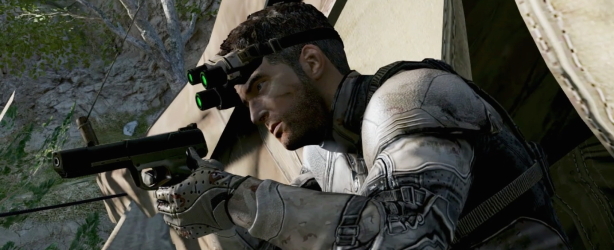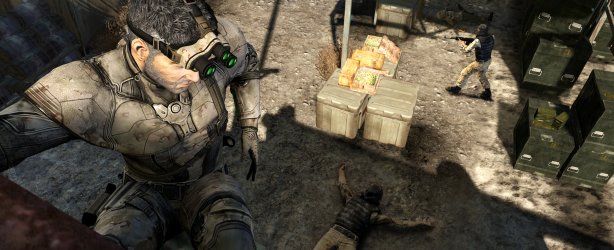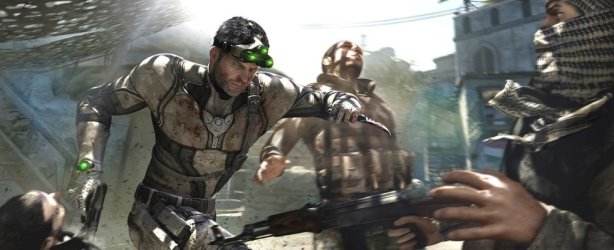
Developer: Ubisoft Toronto
Publisher: Ubisoft
Platform(s): PC, PS3, Xbox 360, Wii U
Splinter Cell: Blacklist’s lead character Sam Fisher is paid handsomely each time he punches a dog in the head.
Each dog that Sam punches in the head awards him with money that he can use to buy new equipment to... well, become more effective at punching dogs in the head. He works on a Punch Dog In The Head by Punch Dog In The Head basis.
He is also paid money for each human enemy he incapacitates - the same amount as for putting down a dog. We mention the dogs first because it better states how ridiculous this appears. You’d find it tough to imagine a bean-counter sitting behind a desk looking over invoices, wearing a visor, studying the paper in front of him and wondering if a spy could really punch all these dogs or if it’s a budget scam. As there’s no context as to who is signing off on these bonuses, nor why they’ve a vendetta against Canis Lupus Familiaris, it’s very silly. You’re probably not supposed to think very hard about it.
You probably should be thinking pretty hard about it.

Splinter Cell: Blacklist picks up soon after the events of Splinter Cell: Conviction. This game absolutely does not make any concession to players who have forgotten everything about the previous or never gone anywhere near it. You're expected to, at every point a reference emerges, nod your head in recognition. It’s made eerier because they've changed Sam Fisher’s voice actor and character model a slight bit. You spend a while wondering if you’re even playing as the same person while people around are all shouting exposition.
Sam has recently taken the reigns as head of Fourth Echelon, a government funded spy-agency built on the ashes of the previous “Third Echelon”, utterly compromised in the previous game for Plot Reasons.
There’s an in medias res opening scene. A small group of specially trained military personnel attack a US base in Guam. As Fisher, you escape from a wrecked helicopter initially headed away from this base and return the area to stability by sneaking up on people and punching them in the head or stabbing them with a Karambit. This weapon, by the way, was (near ritualistically) handed to him in exchange for any firearms he was not permitted to use on his upcoming intended mission.
It’s later revealed that these soldiers are - at least initially - posing as anti-imperialists, whose only demand is that America withdraw any troops stationed around the world and return them home. If the government is unwilling to comply then more attacks will take place every seven days.

In response the player proves that this is an unreasonable request by going on a “punching dogs in the head around the world” tour for the next few missions. Your reaction to this attack is to inevitably cause as much damage, eventually harming as many people as were previously harmed, but your actions are in an attempt to maintain a nation’s encroaching global military presence. so it's fine.
No one on your team, not even a ridiculous comic relief jokey-nerd-hacker-stereotype, has a word to offer on whether or not you’re doing the right thing.
It would seem justified if you were able to take revenge for the lives that have been lost, but in the levels I was able to play, not a single target of my aggression was actively involved in this initial conflict. Especially not the dogs. Dogs can’t plan attacks on military bases, and even if they could, they wouldn’t.
The first mission’s combatants were a local military force protecting an informant being questioned. In the second Sam investigates a suspicious internet signal that has been discovered by one of your team monitoring the Baddie’s internet traffic. The latter made us wonder why we didn’t just go after the source if we apparently know where they’re googling things from.
Your actions don’t ever seem justified because of this inability to effectively recognise your target and go after it. Unintentionally the way that Cash-For-Dog-Punch works raises a difficult consideration about how Sam is incentivised to enter an environment and actively cause as much needless bodily harm as possible. He is a professional spy trained foremost in the art of stealth and remaining undetected, but instead he uses his powers to punch dogs in the head. For money. If he leaves everyone alone he doesn’t earn his pay cheque. That seems like an odd oversight for someone the narrative tries to suggest is morally correct, especially a narrative that can’t actually seem to establish what the people you’re punching have done to deserve it. That doesn’t seem at all like espionage, that’s mercenary work.
You’re Sam Fisher: Dog Puncher for hire.

Long before our preview, writer Tom Bissell wrote a criticism of the game’s disgusting (laughable, too, but let’s settle for disgusting) and needless use of torture in an entirely uncritical manner. A section provided a moral choice only after you were forced to induce pain in someone helpless. If you didn’t want to be party to this activity you weren’t able to continue. This tumor has since been excised, but what remains is the thoughtlessness which brought it into existence. The feeling that development continued without anyone taking the chance to look inward, examine the entire narrative and justify why this game even exists.
Splinter Cell: Blacklist has a lot of problems. There are mechanical oddities that take a step back from what was achieved in the previous game, but these almost pale in comparison to the narrative flaws, with the game making gross political statements that are tough to empathise with, not to mention tough to accept as motivation for your actions.
A military base was attacked, which is terrible, but your response is to punch dogs in the head. What did those dogs do to you?
Publisher: Ubisoft
Platform(s): PC, PS3, Xbox 360, Wii U
Splinter Cell: Blacklist’s lead character Sam Fisher is paid handsomely each time he punches a dog in the head.
Each dog that Sam punches in the head awards him with money that he can use to buy new equipment to... well, become more effective at punching dogs in the head. He works on a Punch Dog In The Head by Punch Dog In The Head basis.
He is also paid money for each human enemy he incapacitates - the same amount as for putting down a dog. We mention the dogs first because it better states how ridiculous this appears. You’d find it tough to imagine a bean-counter sitting behind a desk looking over invoices, wearing a visor, studying the paper in front of him and wondering if a spy could really punch all these dogs or if it’s a budget scam. As there’s no context as to who is signing off on these bonuses, nor why they’ve a vendetta against Canis Lupus Familiaris, it’s very silly. You’re probably not supposed to think very hard about it.
You probably should be thinking pretty hard about it.

Splinter Cell: Blacklist picks up soon after the events of Splinter Cell: Conviction. This game absolutely does not make any concession to players who have forgotten everything about the previous or never gone anywhere near it. You're expected to, at every point a reference emerges, nod your head in recognition. It’s made eerier because they've changed Sam Fisher’s voice actor and character model a slight bit. You spend a while wondering if you’re even playing as the same person while people around are all shouting exposition.
Sam has recently taken the reigns as head of Fourth Echelon, a government funded spy-agency built on the ashes of the previous “Third Echelon”, utterly compromised in the previous game for Plot Reasons.
There’s an in medias res opening scene. A small group of specially trained military personnel attack a US base in Guam. As Fisher, you escape from a wrecked helicopter initially headed away from this base and return the area to stability by sneaking up on people and punching them in the head or stabbing them with a Karambit. This weapon, by the way, was (near ritualistically) handed to him in exchange for any firearms he was not permitted to use on his upcoming intended mission.
It’s later revealed that these soldiers are - at least initially - posing as anti-imperialists, whose only demand is that America withdraw any troops stationed around the world and return them home. If the government is unwilling to comply then more attacks will take place every seven days.

In response the player proves that this is an unreasonable request by going on a “punching dogs in the head around the world” tour for the next few missions. Your reaction to this attack is to inevitably cause as much damage, eventually harming as many people as were previously harmed, but your actions are in an attempt to maintain a nation’s encroaching global military presence. so it's fine.
No one on your team, not even a ridiculous comic relief jokey-nerd-hacker-stereotype, has a word to offer on whether or not you’re doing the right thing.
It would seem justified if you were able to take revenge for the lives that have been lost, but in the levels I was able to play, not a single target of my aggression was actively involved in this initial conflict. Especially not the dogs. Dogs can’t plan attacks on military bases, and even if they could, they wouldn’t.
The first mission’s combatants were a local military force protecting an informant being questioned. In the second Sam investigates a suspicious internet signal that has been discovered by one of your team monitoring the Baddie’s internet traffic. The latter made us wonder why we didn’t just go after the source if we apparently know where they’re googling things from.
Your actions don’t ever seem justified because of this inability to effectively recognise your target and go after it. Unintentionally the way that Cash-For-Dog-Punch works raises a difficult consideration about how Sam is incentivised to enter an environment and actively cause as much needless bodily harm as possible. He is a professional spy trained foremost in the art of stealth and remaining undetected, but instead he uses his powers to punch dogs in the head. For money. If he leaves everyone alone he doesn’t earn his pay cheque. That seems like an odd oversight for someone the narrative tries to suggest is morally correct, especially a narrative that can’t actually seem to establish what the people you’re punching have done to deserve it. That doesn’t seem at all like espionage, that’s mercenary work.
You’re Sam Fisher: Dog Puncher for hire.

Long before our preview, writer Tom Bissell wrote a criticism of the game’s disgusting (laughable, too, but let’s settle for disgusting) and needless use of torture in an entirely uncritical manner. A section provided a moral choice only after you were forced to induce pain in someone helpless. If you didn’t want to be party to this activity you weren’t able to continue. This tumor has since been excised, but what remains is the thoughtlessness which brought it into existence. The feeling that development continued without anyone taking the chance to look inward, examine the entire narrative and justify why this game even exists.
Splinter Cell: Blacklist has a lot of problems. There are mechanical oddities that take a step back from what was achieved in the previous game, but these almost pale in comparison to the narrative flaws, with the game making gross political statements that are tough to empathise with, not to mention tough to accept as motivation for your actions.
A military base was attacked, which is terrible, but your response is to punch dogs in the head. What did those dogs do to you?

MSI MPG Velox 100R Chassis Review
October 14 2021 | 15:04









Want to comment? Please log in.